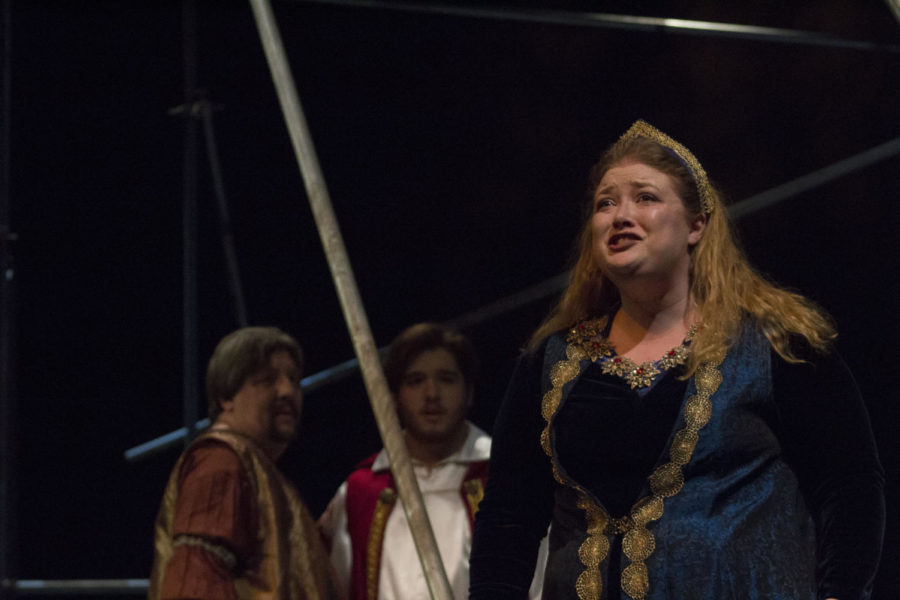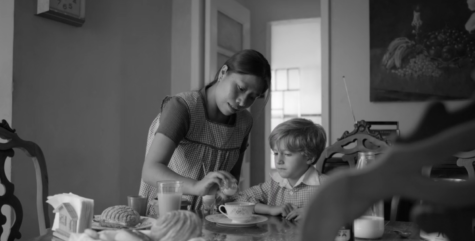- Ames247
- Ames247 / Theater
- App Content
- App Content / Lifestyle
- Arts And Entertainment
- Limelight
- Limelight / Events
- Limelight / Theatre
- Limelight / Theatre / Isu Theatre
ISU Theatre’s ‘The Tempest’ swaps gender roles
April 18, 2017
ISU Theatre’s version of The Tempest may be a bit different from the way Shakespeare intended his play to be told.
Instead, Director Amanda Petefish-Schrag decided to tell the story of The Tempest through her own viewpoint – she cast women as major characters compared to Shakespeare’s, replacing roles previously played by men.
The Tempest, which will debut Thursday at 7:30 p.m. and run periodically throughout the weekend at Fischer Theatre, is a play by William Shakespeare, believed to have been written in 1610 or 1611.
“The Tempest, from a plot perspective, is the story of a woman [Prospero],” Petefish-Schrag, assistant professor in the theatre department, said. [She] has had her title stolen from her in a plot set several years prior to the events of this play, during which her sister [Antonio] sort of conspired against her to take away her dukedom.”
Prospero had been Duke of Milan, but her sisters and others had overthrown her and banished her to an island after she pursued to learn about magic.
The play begins after Prospero, along with her magical servant Ariel, has formed the “perfect storm,” or tempest, to bring her sister to the island she was forced to when Antonio overthrew her, so she may regain her place as the Duke of Milan. Along with Antonio, other conspirators against Prospero have washed ashore.
“One of the interesting things, whenever we study Shakespeare, is the convention in Shakespeare’s time period was not only that most characters were going to be men but all characters … were played by men,” Petefish-Schrag said.
When Shakespeare’s plays were first performed, only men acted in them because being an actor was a man’s job and men played all parts – even those that were female.
“In some ways I think that frees up some choices to say that Shakespeare looked at gender as being somewhat performative,” Petefish-Schrag said.
However, Petefish-Schrag said that she and others wanted to provide opportunities to the diverse group of actors and actresses at Iowa State.
“We live in an age where women can be actors, which is something that during Shakespeare’s time period was not the case,” she said.
Petefish-Schrag said that Shakespeare had most likely intended Miranda, who is played by Ashley Diaz, sophomore in performing arts, to be the only female in this play.
“The play sometimes, I think, can reveal new things when we shake up expectation a little bit,” Petefish-Schrag said. “We’ve certainly tried within the language, other than changing pronouns and titles here and there, we’ve tried to retain the language.
“When I talk about shaking things up, it’s interesting even from the director’s perspective when you’re confronted with a text and suddenly we think about Prospero in a different way.”
Changing Prospero’s gender allowed the cast and crew to explore the play further.
“It opens a lot of possibilities up and you sort of rethink a lot of the text, both in terms of the things that remain unchanged and then some of the surprising things that are revealed,” Petefish-Schrag said.
Petefish-Schrag said many roles have changed from men to women. With these changes, the cast is now “equally balanced” in terms of gender.
The play is considered by many to be Shakespeare’s last play that he had written by himself, and coincidentally it is going to be the last show performed for the 2017 spring semester at Iowa State.
“It’s a play that often gets associated with endings,” Petefish-Schrag said. “Because Prospero, within the play, talks a lot about bringing things to their conclusion and bringing things to their end.”
Though the play was not purposely slated as the final production of the semester, Petefish-Schrag took delight in the coincidence.
“So, I think that even though that wasn’t intentional on our part, I do think that there is a lot about this play that suggests bringing things to a close.”
She also said that as much as she thinks the play is about endings, she believes that it is also about beginnings and “how we move forward or reconcile the sins of the past to make a new path.”
The show will debut at 7:30 p.m. Thursday, Friday and Saturday at Fisher Theatre. A matinee show will start at 2 p.m. Sunday. Tickets can be purchased at the door, through the Iowa State Center Ticket Office or through TicketMaster.















